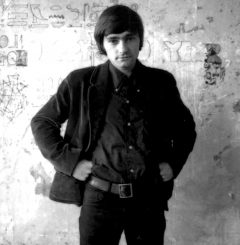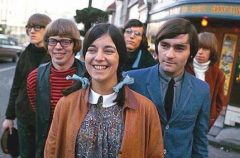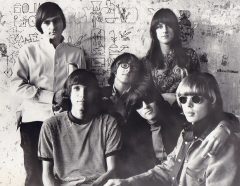Yesterday And Today
Marty Balin: An Appreciation
Marty Balin, co-founder, lead singer, and a principal songwriter for the iconic ’60s band Jefferson Airplane, died September 27, 2018, at the age of 76. The cause of death hasn’t yet been disclosed. It’s always sad when a musical talent from your prime music listening years passes on, and although natural as it is to reflect upon morosely, I found myself smiling, remembering why I liked him beyond his psychedelic pedigree. During the infamous Altamont Rock Festival of 1969, when the Rolling Stones were convinced to headline a hastily and badly planned “West Coast Woodstock” at a motor speedway, it was obvious from those in the know that the fete was doomed to disaster; the producers had the monumentally bad idea to hire the Hells Angels as security. To wit, when audience members crowded the front of the festival stage during the Jefferson Airplane’s performance, Angels “security” began beating up unfortunate attendees. Seeing this, Balin left his microphone and jumped into the crowd to intervene in the beating. Balin received a beating himself from the hired help. He was knocked unconscious. Nothing about Altamont turned out right, with the death at the hands of the Angels security of a young black man. But my respect for Balin grew immensely. Balin jumped in, man, was my refrain for years when speaking of the unique vocalese of the Airplane’s singing partnership. He stepped in, he stepped up, he took a fist in the face to do the right thing.
Born Martyn Jerel Buchwald on January 30, 1942, of immigrant parents in Cincinnati, Ohio, Balin changed his name in 1962 and did some early recording for Challenge Records. Later, he moved on from pop-rock and became a folkie, leading a folk music foursome called the Town Criers. In time he moved to California’s Bay Area, knocking around as guitarist and folk musician, eventually meeting fellow Jefferson Airplane co-founders Paul Kanter and original lead vocalist Signe Anderson. After some gigging around area clubs and venues, lead guitarist Jorma Kaukonen, bassist Jack Casady, and drummer Skip Spence joined the troupe, and soon afterward they released their 1966 debut album Jefferson Airplane Takes Off. The nascent band earned a growing popular following and later gained national attention in 1967 after Anderson left the band and was replaced by Grace Slick and the release of their second album, the classic Surrealistic Pillow. This was the classic formation that remained intact for their best and most creative period.
Jefferson Airplane was a side of psychedelic rock I found most appealing, being in their short-lived prime a volatile and imaginative forced marriage of folk tradition, jazzy “mystery chords,” Joycean/ Eliot verifying, and bracing harmonies provided by the bulldozing Grace Slick and Balin’s bittersweet tenor. Their albums were a fascinating, eclectic mess, indulgent and snotty and harsh; I would put them, along with the Stooges, MC5, and the Velvet Underground, as stylistic forerunners of the punk rock anti-aesthetic. Balin was the ballast for the band–a balladeer, a genuine folk singer, a romantic who never abandoned his tendency for the oddly effective lyric that emphasized an actual relationship rather than a worldview. He was the sensual, intuitive romantic that balanced Slick’s jagged surrealism and Dadaesque wit. Even as the jarring exponents of what was called “acid rock,” the musical evocation of the hallucinogenic LSD trip intended to expand consciousness and such, Balin’s strongest songs, lyric, disarming, reasonably center in relatable emotion and sentiment, was something of the sane center of a band otherwise committed to the vagaries of extreme experience. A jangling folk rocker with “It’s No Secret,” an able writer of street-action anthems like “Volunteers,” the loneliest of the lonely true hearts in “Coming Back to Me,” or a perplexed consciousness sussing through confounding circumstances with angular hard rock tempos, Balin was an essential presence and creative force in a great but generally unstable band. Both the quality of his songwriting, both alone and as a collaborator, and the sincere, crooning anguish of his vocals was an irreplaceable weave through Jefferson Airplane’s discography between 1966 through 1969: five studio albums and one blistering live set, one of the strongest of any American rock band from the period.
I liked this band up until 1969’s Volunteers album when Paul Kanter’s sci-fi libertarian fantasizes turned J.A. into a plodding monstrosity of ego and half-measured music. Those among the readership who followed the career arc of this band through the ’60s and the ’70s will recall, perhaps stifling a gag reflex, the slew of Jefferson Starship albums that evolved from the original band. It will suffice it to say for this short note that the best thing the Starship ever did was recording and releasing Marty Balin’s vocal on a fabulous Roger Cook song “Miracles.” This is a case where a vocalist takes possession of a song he didn’t compose and makes it his alone. Balin turns it into a sensuous, radiant ode to the act and the sensual philosophy of romantic sex with your partner. It was a refreshing difference of how a male talk of such things.
It was the best thing Jefferson Starship ever did, a masterpiece of pop-rock sexuality that rose to canonical heights over the increasing vapidity and knuckleheaded irrelevance. The band, or at least the management and record company, hung their heads in shame all the way to the bank, and it remains, I suppose, the supreme irony of things that a band beginning as Jefferson Airplane, counterculture revolutionaries singing of a society without pretense, class structure, false morality and, by implication, cash, evolved into the Jefferson Starship, a cash cow for corporate interests. So yes, money changes everything. That said, it should be mentioned that the guitar work of Jorma and Jack Cassidy’s basslines were among the best teams of the era. And Balin was a fine musician, singer, and songwriter who might have done better if he had a less dicey means to bring his music to the public.













